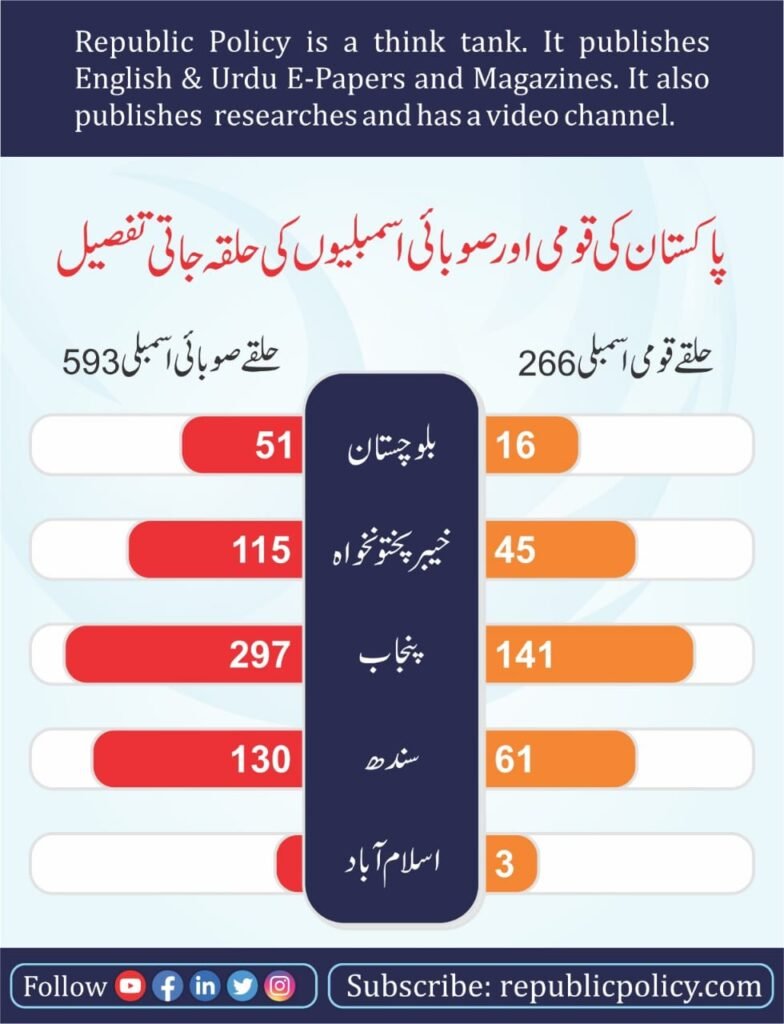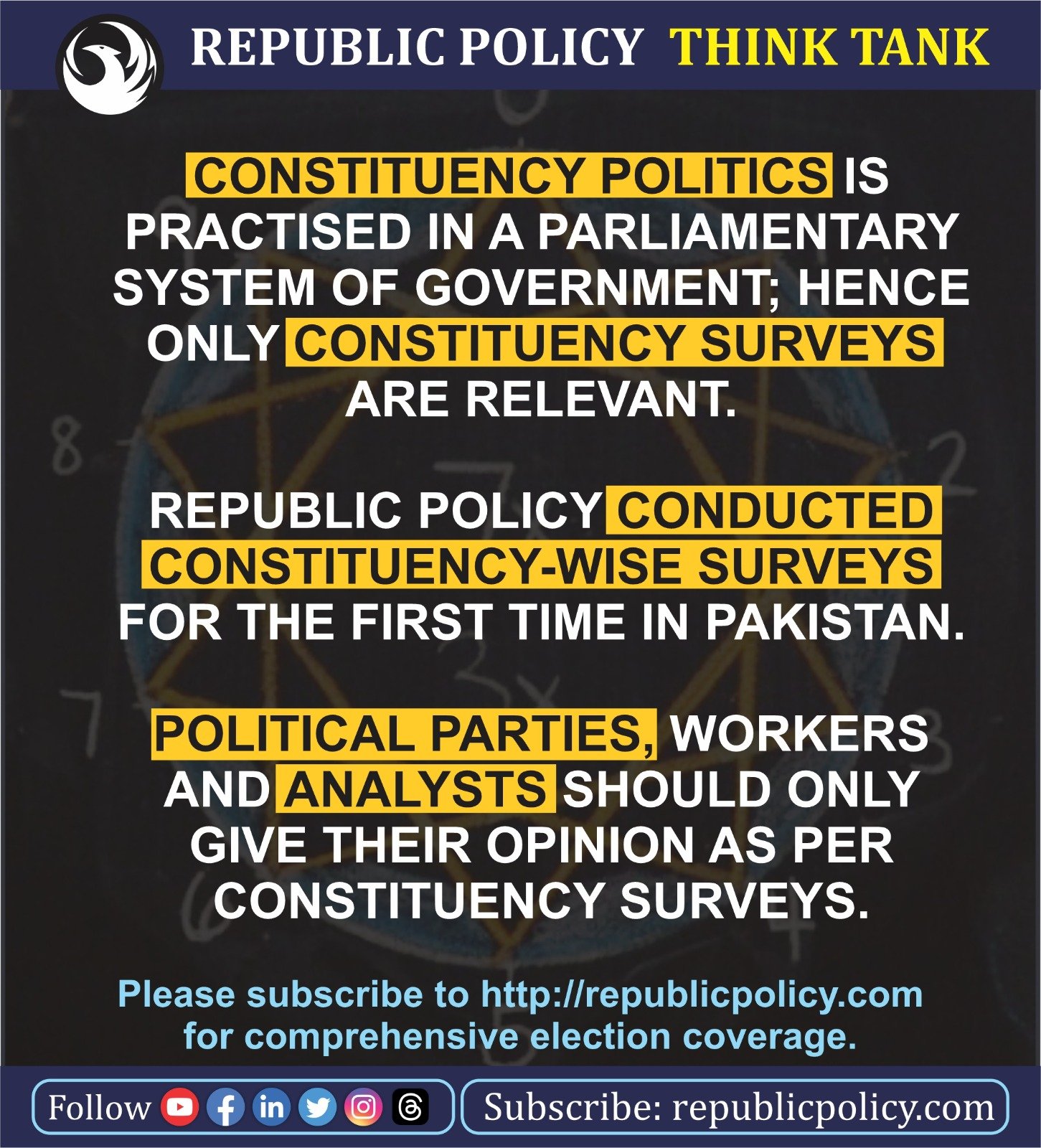Tahir Maqsood Chheena
Understanding the Importance of Constituency Surveys for Pakistani Politics!
A survey is a method of gathering information using relevant questions from a sample of people to understand trends of populations as a whole. Surveys provide a critical source of data and insights for everyone engaged in the information economy, from businesses to media, to government and academics. Surveys can take multiple forms but are most common in the form of a questionnaire, either written or online. Fundamentally, a survey is a method of gathering information from a sample of people, traditionally intending to generalize the results to a larger population.
An election survey is a type of survey that aims to measure the opinions or behaviour of voters or potential voters regarding political candidates or issues. Election surveys can be conducted before (pre-poll), during (exit poll), or after (post-poll) an election. Election surveys can help politicians understand their strengths and weaknesses, gauge public support or opposition to their policies or platforms, identify key issues or concerns for voters, and predict or explain election outcomes.
please, subscribe the YouTube channel of republicpolicy.com
A constituency survey is a type of election survey that focuses on a specific electoral district or area within a country that elects one or more representatives to a legislature. A constituency survey can help politicians or parties tailor their campaigns or messages to their voters’ local needs or preferences. A constituency survey can also help researchers or analysts compare how different regions or groups within a country vary in their political opinions or behaviour. Therefore, it is critical that politicians, analysts and political workers may take the foundation of their political decisions depending upon constituency surveys.
A parliamentary form of government is one where the executive branch (the head of government and cabinet) is accountable to and dependent on the legislative branch (the parliament). The head of government (usually called the prime minister) is selected by the parliament from among its members. The head of state (traditionally named president or monarch) is separate from the head of government and has mostly ceremonial or symbolic functions. A parliamentary system can have different types of electoral systems for choosing members of parliament (such as first-past-the-post or proportional representation) and different types of constituencies (such as single-member or multi-member districts). Pakistan is a parliamentary form of governance.
A presidential form of government is one where the people directly elect the executive branch (the president) for a fixed term and is independent of the legislative branch (the legislature). The president serves as both the head of state and the head of government and has significant powers over domestic and foreign policy. A presidential system usually has a single-member district electoral system for choosing the president and members of Congress.
The differences between presidential and parliamentary surveys are mainly related to the different roles and functions of each system’s head of state and the head of government. In a presidential survey, the main focus is on the popularity or approval of the president, who is both the head of state and the head of government, and who represents the whole country. However, this measurement is done through the constituencies to ascertain which political party is winning the elections. Therefore, winning constituencies are a fundamental part of the parliamentary system, and surveys must reflect which party is winning how many seats. In a parliamentary survey, the main focus is on the popularity or approval of the prime minister, who is the head of government, and who represents a specific party or coalition. The head of state in a parliamentary system may or may not be included in a survey, depending on their relevance or influence. For example, in some parliamentary systems, such as Germany, Pakistan or India, the head of state is elected by an electoral college and has some political powers, while in others, such as Britain or Canada, the head of state is a hereditary monarch and has mostly ceremonial duties. Hence, constituency-based surveys are the true reflection of a parliamentary form of government as fixed in Pakistan.
please subscribe republicpolicy.com to have access to comprehensive election coverage.
One possible reason to conduct constituency-based surveys in Pakistan is to know the voters’ pulse and understand their opinions, preferences, attitudes, or expectations regarding political candidates or issues. Constituency-based surveys can help politicians or parties design campaigns or strategies to appeal to their target voters or constituencies. Constituency-based surveys can also help researchers or analysts study how different regions or groups within Pakistan vary in their political behaviour or culture. For example, constituency-based surveys can reveal how voters in urban or rural areas, in different provinces or ethnic groups, or in other religious sects differ in their support for various parties or policies.
Following is the chart of the constituencies in Pakistan. Therefore, the political parties must strategize accordingly. Lastly, the only relevant part is which party wins the more constituencies to form the governments at the federal and provincial levels. Thus, the surveys should only show the political trends of constituencies as it is constituency politics in Pakistan.

The elections are around the corner. Therefore, it is critical that free and transparent elections are conducted in Pakistan. It is constituency politics in Pakistan and each constituency is different from the other. There are vivid cultural, ethnic, ideological, economic, geographical and political divisions. Therefore, political surveys are a complex phenomenon. Therefore, the methods, techniques of representation of communities is critical. Then, the sample size of the constituency should be representative. Accordingly, the union council is the smallest unit in a constituency where the political measurement can be measured a bit fairly. However, it is ever-changing politics in Pakistan. Therefore, election surveys are limited in their context, execution and forming opinions. Politics keep changing in Pakistan till the last movement and also, election campaign and polling day management are equally significant.
Please, subscribe the magazines of republicpolicy.com
















